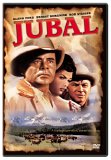| Reviews & Columns |
|
Reviews DVD TV on DVD Blu-ray 4K UHD International DVDs In Theaters Reviews by Studio Video Games Features Collector Series DVDs Easter Egg Database Interviews DVD Talk Radio Feature Articles Columns Anime Talk DVD Savant Horror DVDs The M.O.D. Squad Art House HD Talk Silent DVD
|
DVD Talk Forum |
|
|
| Resources |
|
DVD Price Search Customer Service #'s RCE Info Links |
|
Columns
|
|
|
Jubal
Loner Jubal Troop (Glenn Ford, in the Cassio role), a cowboy down on his luck and reduced to sheepherding, is exhausted after losing his horse halfway through a treacherous mountain pass. He's discovered by vulgar but good-natured cattle rancher Shep Horgan (Borgnine). Shep invites Jubal to join cowboys Sam (Noah Berry, Jr.) and Carson (John Dierkes) on his medium-size ranch, but another hand, Pinky (Steiger), takes an instant dislike to Jubal, who he says "smells of sheep-dip."
But Jubal proves his mettle over the next few days, so much so that Shep is impressed enough to offer Jubal a permanent position on the ranch as its foreman. This, of course, doesn't sit well with the unrelentingly bitter Pinky, especially after Shep's beautiful and much younger wife, Mae (Valerie French), makes unreturned advances toward Jubal.
Tensions flare further when a wagon train of missionary types (possibly they're Mormons, but this is never made clear) make camp on Shep's land. Pinky, part-time leader of a band of anti-settler cowboys, threatens the God-fearing "rawhiders," but Jubal shows up and overrules Pinky's demands that they clear out. Jubal then hires a cowboy traveling with the missionaries, Reb (Charles Bronson), further eroding Pinky's power. Frustrated and aware of Mae's continued advances, Pinky plants the seed of jealously in Shep's mind, that Jubal is surreptitously stealing his wife.
As a riff on Othello, Jubal is not terribly successful. In his second psycho-cowboy role in less than two years (the other, of course, was Jud Fry in the musical Oklahoma!, which is almost a twin of his performance here), Steiger is disappointingly one-note and hammy. The character engenders no sympathy or understanding; he's simply repellent, and the actor seems disinterested in the character. Borgnine fairs little better, playing a man naive beyond all believability. With nothing to play Borgnine, normally a superb and much undervalued talent, opts for a broadly-played likeability in his early scenes, and the intensity of a rabid animal after Pinky's taunting.
Glenn Ford's title character works better, a drifter who, as a child, nearly drowned as his unloving mother stood nearby, ready to watch her unwanted offspring die. His affection for Shep and leeriness around Mae is subtly played. Ford was always especially good with characters ill at ease and uncomfortable in their own skin. It's a shame the other leading parts are painted with such broad strokes.
Conversely, Jubal is interesting to watch for the meaty supporting roles given to actors usually not so lucky in big studio films or, in Bronson's case, an actor more than a decade away from real stardom. Having recently changed his stage name from Buchinski, Bronson was starting to get noticed, and his part here - a quietly decent man quick with a gun - is a good early showcase. John Dierkes, whose towering (six-feet, six-inch) presence, thick features but soft voice made him especially hard to cast, shares quality screen time with Noah Berry, Jr., whose part rises above the best-buddy roles he usually landed in Westerns.
French, a British actress whose strange accent is unconvincingly explained away as Canadian, was with co-star Felicia Farr (who plays Ford's real love interest) newly contracted at Columbia Studios, though neither was well-served there (Farr presumably met future husband Jack Lemmon, another contractee, on the Columbia lot).
Jubal was directed and co-written by Delmer Daves, whose Broken Arrow (1950) is among the decade's finest Westerns. His other genre credits include Drum Beat (1954), 3:10 to Yuma (1957), and Cowboy (1958), the latter two also starring Ford. Jubal, though not bad, isn't as good of as any of those.
Video & Audio
Filmed in CinemaScope, Jubal is presented in its original 2.35:1 aspect ratio in 16:9 anamorphic wide screen. The image, originally printed by Technicolor, is a tad greenish-brown (clouds are this color, for instance, rather than white) but generally quite acceptable, with good grain and contrast. The Dolby Digital mono is a disappointment; the film almost certainly was released in 4-track magnetic stereo in some theaters and the late David Raksin's score cries out for stereophonic treatment. Optional English and Japanese (but not French or Spanish) subtitles are included. There are no Extra Features, not even a trailer.
Parting Thoughts
Though somewhat disappointing in its Othello-esque scenes with Borgnine and especially Steiger, Jubal isn't half bad. Ford and the supporting cast give it some nice character shading, while Charles Lawton, Jr.'s cinematography makes full use of the then-new CinemaScope screen shape and Wyoming locations. Recommended.
Stuart Galbraith IV is a Los Angeles and Kyoto-based film historian whose work includes The Emperor and the Wolf -- The Lives and Films of Akira Kurosawa and Toshiro Mifune. His new book, Cinema Nippon will be published by Taschen in 2005.
|
| Popular Reviews |
| Sponsored Links |
|
|
| Sponsored Links |
|
|
| Release List | Reviews | Shop | Newsletter | Forum | DVD Giveaways | Blu-Ray | Advertise |
|
Copyright 2024 DVDTalk.com All Rights Reserved. Legal Info, Privacy Policy, Terms of Use,
Manage Preferences,
Your Privacy Choices | |||||||














